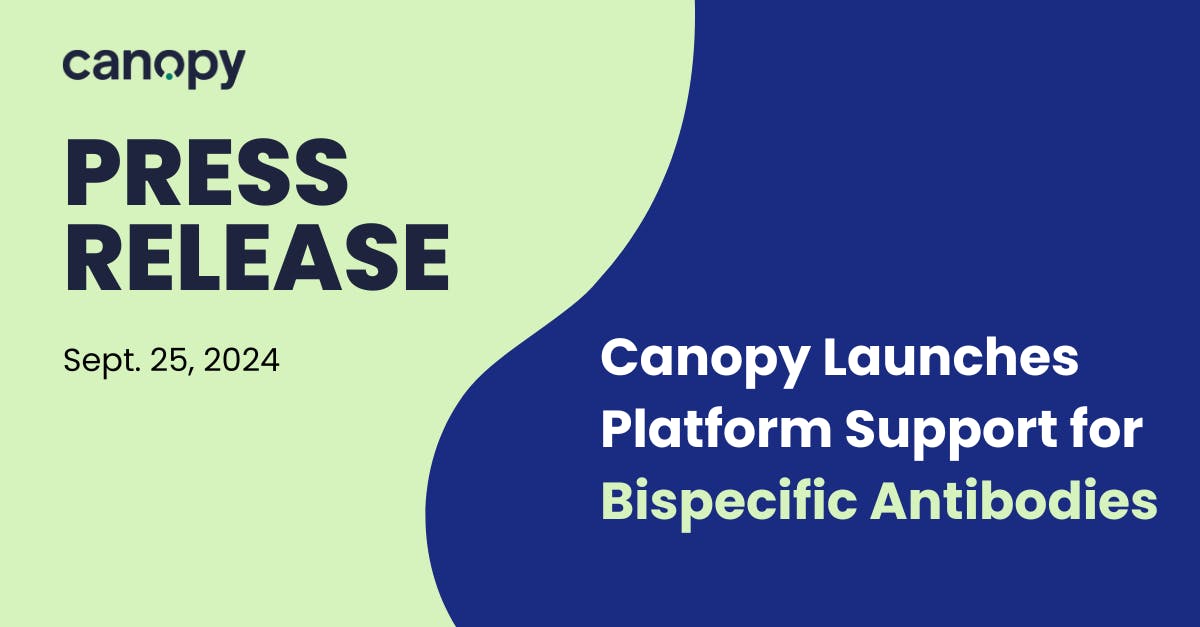Facilitating the Safe Integration of Bispecific Antibodies into Community Oncology
Canopy, the first Continuous Care Platform for oncology, today announced platform-wide support for bispecific antibodies. This support includes Remote Therapeutic Monitoring, smart triage algorithms, and decision-support pathways for CRS and ICANs.
Bispecific antibodies (BsAbs) are a next-generation advancement in monoclonal antibody (mAb) therapy. By simultaneously targeting two antigens or epitopes, they can elicit multiple physiological or anti-tumor responses, acting like a “cocktail” of two mAbs. This dual-targeting approach produces significant treatment effects. With 10 BsAbs already approved across both solid tumors and hematologic cancers—including the recent approval in non-small cell lung cancer—and over 220 oncology-focused BsAbs currently in development, the adoption of these therapies in community oncology is expected to grow rapidly.¹
However, BsAbs bring a combination of novel toxicities and complex management guidelines. These range from common symptoms, such as diarrhea or rash that may be severe and appear at unpredictable times, to dangerous conditions, including Cytokine Release Syndrome (CRS) and Immune Effector Cell-Associated Neurotoxicity Syndrome (ICANS), or even rare and potentially life-threatening toxicities. As a result, oncology practices face multiple barriers to adoption, especially in the outpatient setting, including the need for specialized protocols and training and the integration of high-frequency remote patient monitoring into clinical operations.
“Patients receiving these treatments require vigilant monitoring and nuanced management to ensure safety. Canopy’s technology plays a crucial role in keeping patients safe when they’re away from the clinic, especially when administering bispecific antibodies and CAR-T in the outpatient setting." —James Essell, MD, Medical Director of the Center for Cancer and Cellular Therapy at Oncology Hematology Care (OHC) and The Jewish Hospital, and Chair for Cellular Therapy at Sarah Cannon Research Institute.
With Canopy, practices can seamlessly monitor their patients for BsAbs-induced toxicities, including CRS and ICANS. Smart monitoring schedules check in with patients through digital assessments via app, web, or phone. Canopy’s intelligent triage algorithms allow busy nurses to focus on the patients who need them the most and enable rapid issue resolution with standardized symptom pathways.
"The clinical impact of continuous care models, especially those incorporating ePRO-based monitoring, has been widely demonstrated in oncology, showing significant benefits for patients. As new therapies like bispecific antibodies become more common, these models are now essential for safely and effectively managing care in the outpatient setting.” —Michael Kolodziej, MD, Chief Medical Officer of Canopy
Studies of the Canopy ePRO and Platform demonstrate positive clinical outcomes for patients, including a 22% reduction in ER visits and hospitalizations and up to a 45% increase in treatment persistence at 3 months.
- 88% ePRO engagement at 6 months²
- 22% reduction in ER visits³
- 22%-45% increased treatment persistence at 3 months⁴
“At Canopy, we’ve traditionally focused on supporting practices with managing existing patients on therapy. Now, we're incredibly proud to go beyond that by supporting practices in adopting new and life-saving therapies.” —Lavi Kwiatkowsky, Founder & CEO of Canopy.
Canopy recently announced partnerships with New York Cancer & Blood Specialists, Oncology Consultants, The Toledo Clinic Cancer Centers, and Northwest Hematology & Oncology, rapidly growing its network of leading oncology practices.
Schedule a Demo
Contact the Canopy team to schedule a demo.
About Canopy
Canopy provides oncology practices with a comprehensive platform for all the care that happens between visits. Canopy’s multi-channel ePRO and remote triage system enable practices to identify and prioritize patients who need help, resolve their issues using intelligent software, and generate new reimbursement streams from high-quality care. For more information, visit www.canopycare.us.
- McKesson. (2023). Integrating bispecific antibody treatments into your community oncology practice: Internal McKesson analysis using ODIN 2.0 release September 2023. McKesson.
- Cherny, N. I., Parrinello, C. M., Kwiatkowsky, L., Hunnicutt, J., Beck, T., Schaefer, E., Thurow, T., & Kolodziej, M. (2022). Feasibility of Large-Scale Implementation of an Electronic Patient-Reported Outcome Remote Monitoring System for Patients on Active Treatment at a Community Cancer Center. JCO Oncology Practice, 18(12), e1918-e1926. DOI: 10.1200/OP.22.00180
- Kolodziej, M. A., Kwiatkowsky, L., Parrinello, C., Thurow, T., Schaefer, E. S., Beck, J. T., Cherny, N., & Blau, S. (2022). ePRO-based digital symptom monitoring in a community oncology practice to reduce emergency room and inpatient utilization. Journal of Clinical Oncology, 40(16_suppl), 1508.
Authors observed a 22 percent lower rate of adverse clinical events, specifically emergency room and hospital admission. - Parrinello, C., Calkins, G., Kwiatkowsky, L., Schaefer, E. S., Beck, J. T., Ellis, A. R., Blau, S., Telivala, B. P., & Kolodziej, M. A. (2022). Time on treatment is prolonged in patients utilizing an ePRO based digital symptom monitoring platform in the community setting. Journal of Clinical Oncology, 40(16_suppl), 1528. DOI: 10.1200/JCO.2022.40.16_suppl.1528
